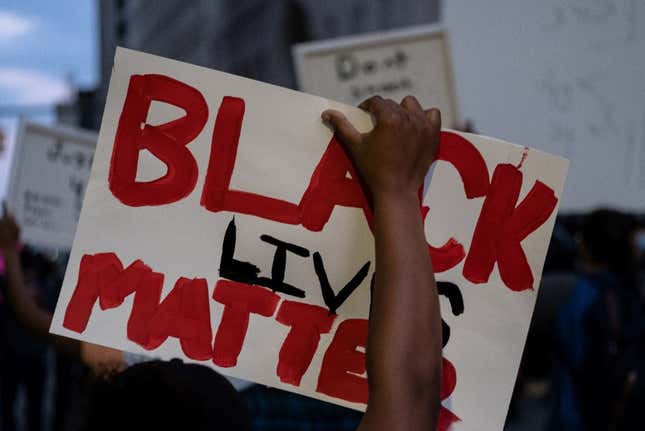
Last month, a number of Black Lives Matter demonstrators smashed windows and splashed red paint all over the Salt Lake County District Attorney’s Office during a protest against racial injustice. Now, they might be facing up to life in prison because prosecutors are adding a gang enhancement to their felony criminal mischief charges.
The Associated Press reports that prosecutors argued this week that the gang charges are justified because participants teamed up to cause thousands of dollars in property damage while protesting police brutality—and specifically, the case of 22-year-old Bernardo Palacios-Carbajal, according to The Hill.
Palacios-Carbajal was fatally shot while running from Salt Lake County police officers on May 23. The county’s district attorney, Sim Gill, argued in court last month that the officers shouldn’t be charged with crimes.
The District Attorney’s Office’s decision to add the 1990s-era gang enhancements law to protesters’ charges isn’t sitting right with a lot of people, including, of course, those being charged.
From AP:
“This is so far beyond just the enforcement of the law, it feels retaliatory,” said Madalena McNeil, who is facing a potential life sentence over felony criminal mischief and riot charges. Charging documents say she bought red paint at a Home Depot before the July 9 demonstration sparked by a fatal police shooting ruling. She later yelled at and shifted her weight as if to slam into police during the demonstration, charges state. “It’s really frustrating and scary ... I just feel so much concern for what this means for the right to protest in general.”
The charges have Democratic leaders at odds in Salt Lake City, the liberal-leaning capital of conservative Utah, with the top county prosecutor arguing vandalism crossed a line and the mayor calling the charges too extreme.
According to the Salt Lake Tribune, six protesters—McNeil, Marvin Oliveros, Sofia Alcalá, Madison Alleman, Viviane Turman, Michelle Mower and Emanuel Hill—would normally be looking at second-degree felony charges at worst but the gang enhancement bumps them up to first-degree. Attorneys for the protesters are arguing that Gill is simply being vindictive because his office was damaged.
From the Tribune:
Brent Huff, who represents Alleman, said the charges were “retaliatory,” claiming they are “aimed at politics rather than justice.” Cliff Venable, who represents Mustafic, said the charges against his client are “not warranted.” Jesse Nix, an attorney for Turman, called the charges “despicable” and “an absolute conflict.”
“I’m disappointed that they didn’t recognize the conflict and send it out to someone else to decide what to charge,” Nix said, “because right now, it feels like Sim Gill is upset at the damage to his beautiful building so he’s going to do everything he can to scare protesters.”
It’s worth mentioning that gang enhancement laws came about during the same decade that the 1994 crime bill became virtually synonymous with the mass incarceration of mostly Black and Latino people. In fact, The Guardian reports that, as of August 2019, 92 percent of those convicted of crimes in California who had gang enhancements added to their charges were Black or Latino, according to data from the California Department of Corrections and Rehabilitation.
There’s a not so subtle irony in using racist laws to prosecute protesters of racial injustice.
Even though the charges the protesters face come with a minimum five-year sentence, Gill says it’s unlikely they will go to prison because “criminal cases often end with a plea to lesser counts,” AP reports.
“I don’t think anyone is going to be going to prison on this,” Gill said adding that “there’s some people who want to engage in protest, but they want to be absolved of any behavior. This is not about protest, this is about people who are engaging in criminal conduct.”

